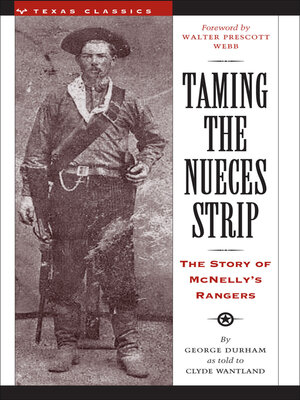
Sign up to save your library
With an OverDrive account, you can save your favorite libraries for at-a-glance information about availability. Find out more about OverDrive accounts.
Find this title in Libby, the library reading app by OverDrive.



Search for a digital library with this title
Title found at these libraries:
| Library Name | Distance |
|---|---|
| Loading... |
“Durham’s account is modest and straightforward . . . has many lessons for anyone interested in the history of the Old West, leadership or law enforcement.” —American West Review
Only an extraordinary Texas Ranger could have cleaned up bandit-plagued Southwest Texas, between the Nueces River and the Rio Grande, in the years following the Civil War. Thousands of raiders on horseback, some of them Anglo-Americans, regularly crossed the river from Mexico to pillage, murder, and rape. Their main objective? To steal cattle, which they herded back across the Rio Grande to sell. Honest citizens found it almost impossible to live in the Nueces Strip.
In desperation, the governor of Texas called on an extraordinary man, Captain Leander M. McNelly, to take command of a Ranger company and stop these border bandits. One of McNelly’s recruits for this task was George Durham, a Georgia farm boy in his teens when he joined the “Little McNellys,” as the Captain’s band called themselves. More than half a century later, it was George Durham, the last surviving “McNelly Ranger,” who recounted the exciting tale of taming the Nueces Strip to San Antonio writer Clyde Wantland.
In Durham’s account, those long-ago days are brought vividly back to life. Once again the daring McNelly leads his courageous band across Southwest Texas to victories against incredible odds. With a boldness that overcame their dismayingly small number, the McNellys succeeded in bringing law and order to the untamed Nueces Strip—succeeded so well that they antagonized certain “upright” citizens who had been pocketing surreptitious dollars from the bandits’ operations.
“The reader seems to smell the acrid gunsmoke and to hear the creak of saddle leather.” —Southwestern Historical Quarterly
Only an extraordinary Texas Ranger could have cleaned up bandit-plagued Southwest Texas, between the Nueces River and the Rio Grande, in the years following the Civil War. Thousands of raiders on horseback, some of them Anglo-Americans, regularly crossed the river from Mexico to pillage, murder, and rape. Their main objective? To steal cattle, which they herded back across the Rio Grande to sell. Honest citizens found it almost impossible to live in the Nueces Strip.
In desperation, the governor of Texas called on an extraordinary man, Captain Leander M. McNelly, to take command of a Ranger company and stop these border bandits. One of McNelly’s recruits for this task was George Durham, a Georgia farm boy in his teens when he joined the “Little McNellys,” as the Captain’s band called themselves. More than half a century later, it was George Durham, the last surviving “McNelly Ranger,” who recounted the exciting tale of taming the Nueces Strip to San Antonio writer Clyde Wantland.
In Durham’s account, those long-ago days are brought vividly back to life. Once again the daring McNelly leads his courageous band across Southwest Texas to victories against incredible odds. With a boldness that overcame their dismayingly small number, the McNellys succeeded in bringing law and order to the untamed Nueces Strip—succeeded so well that they antagonized certain “upright” citizens who had been pocketing surreptitious dollars from the bandits’ operations.
“The reader seems to smell the acrid gunsmoke and to hear the creak of saddle leather.” —Southwestern Historical Quarterly







